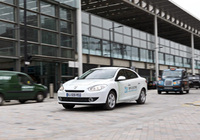Renault’s zero-emission strategy

Renault is taking a pioneering stance on sustainable mobility for all. Its brand signature 'Drive the Change' symbolises the Company’s ongoing bid to reduce the ecological footprint of vehicles through their complete lifecycle, from their design and production, through to their use on the road and to the end of life.
Acutely aware of the importance of the stakes regarding global warming, Renault has worked for many years to reduce the CO2 emissions of its models – throughout their lifecycle – to reduce a vehicle’s ecological impact. Meanwhile, as its environmentally respectful Renault eco² policy demonstrates, Renault believes it is essential to make the most effective technologies available to as many motorists as possible, at prices they can afford.
Electric vehicles represent a clean-break solution aimed at making CO2 emissions-free mobility in road use. Renault estimates that electric vehicles will account for 10 per cent of the world market by 2020. The Renault-Nissan Alliance is investing €4 billion in its zero emissions programme and a 2,000-strong team (1,000 at Renault and 1,000 at Nissan) is already working on electric vehicles.
THE ZERO EMISSION STRATEGY
It was in 2008 that the Alliance announced its intention to mass market zero emission vehicles. This clean break technology is the only affordable solution involving vehicles that emit neither CO2, nor harmful particulates.
Renault's electric vehicle product plan
From next year, Renault will begin to introduce an unprecedented four electric vehicle range, starting with Kangoo Van Z.E. From 2012, three further models will be launched: Fluence Z.E. plus two new, all-electric models which will have their own specific, innovative designs based on the Twizy and Zoe concept cars.
This product plan will enable customers to find the type of vehicle they are looking for in Renault's electric range, since the four models – a small city car, a compact hatchback, a family saloon and an LCV – are set to cover a grand spectrum of motorists' needs.
Infrastructure and existing pilot projects
Within the framework of its zero emissions strategy, the Renault-Nissan Alliance is working actively with governments, administrative bodies, local authorities, energy providers and other partners. To date, it has signed more than 60 agreements across the world aimed at preparing markets and establishing the necessary infrastructure for the mass marketing of electric vehicles from 2011.
These privately- and publicly-steered undertakings indicate that the necessary infrastructures and charging facilities will be operational when electric vehicles come to market.
This will consequently reassure prospective electric vehicle users that simple, practical solutions will be in place to enable them to charge their battery, both at home and by the roadside.

